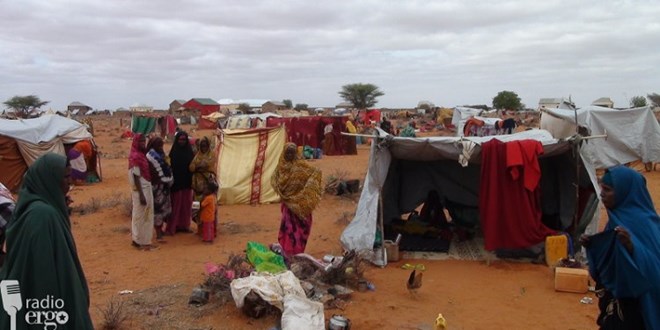
Friday January 21, 2022

Hundreds of pastoralists from some of the most drought-stricken zones in Ethiopia’s Somali Region have been moving to a small town 50 kilometres south-east of the main city Jigjiga, seeking the assistance of local people there for water, food, shelter, and pasture for their livestock.
Elmi Moge Bade borrowed $350 to pay for a vehicle to transport his 100 remaining goats 400 kilometres from his village of Alle-qod to Kebri Beyah in Fafan zone. The journey took three days. When he arrived, a host family built him a traditional nomadic hut and has been giving him three cooked meals a day for the past month.
“The locals here have welcomed us well. Most people were built homes and our remaining livestock were given pasture and water to drink. Personally, I was built a nomadic hut since the people hosting us are nomads,” Elmi said.
Elmi lost 200 goats to the drought and is hoping to keep the rest alive. He sold three goats for $50 and sent the money to his wife and six children back in the village, although he worries about them as life there is tough.
Some 3,000 desperate families from Afder, Shabelle, Korahe and Jarar zones have arrived and been welcomed by host families in Kebri Beyah, where there was rainfall in both the Gu and Deyr seasons last year and pasture grew in the grazing fields.
The problem now is that the reservoirs in Kebri Beyah are drying up quickly with the extra people and animals using the water.
“The locals are now worried that they too might face water shortage. The water reservoirs have been overwhelmed by the huge number of people and livestock that reached here,” Elmi said.
An agro-pastoralist from rural Bilci Buur in Jarar zone, Hersi Muhumed Ismael, told Radio Ergo that he walked 100 kilometres to Kebri Beyah with 150 goats, 10 camels, one wife and six children, taking six days on the road. He left his second wife and six children behind in the village.
“I couldn’t walk with both of my wives and the children. I just came with one, the other one is living in Bilci Buur, where there has been no rain for two years. Only God knows the hardships they live in, they haven’t received any aid from the government,” he said.
Hersi lost 40 of his original herd of 250 goats in his village due to lack of pasture and water. Although a borehole was being drilled in Bilci Buur, he feared the rest of his goats would die if he waited any longer for water to be available there.
He left behind 60 weak goats with his second wife as they were unable to stand and could not manage the journey. Ten goats died on reaching Kebri Beyah after the long trek.
He expressed his gratitude to the local people for helping him and his family with three meals a day, and shelter and water. However, he urged the government, humanitarian agencies, and the diaspora Somali community to send them aid.
“Water is our number one priority at the moment. We request the government to assist us with water and food. This is the fourth time I am being interviewed on the plight of the displaced families here, and still, we haven’t received any aid!” he complained.
Ismael Bader Abdullahi, one of the local pastoralists in Kebri Beyah, told Radio Ergo that they welcomed the arriving families as best they could, but they are worried that water supplies are now becoming exhausted.